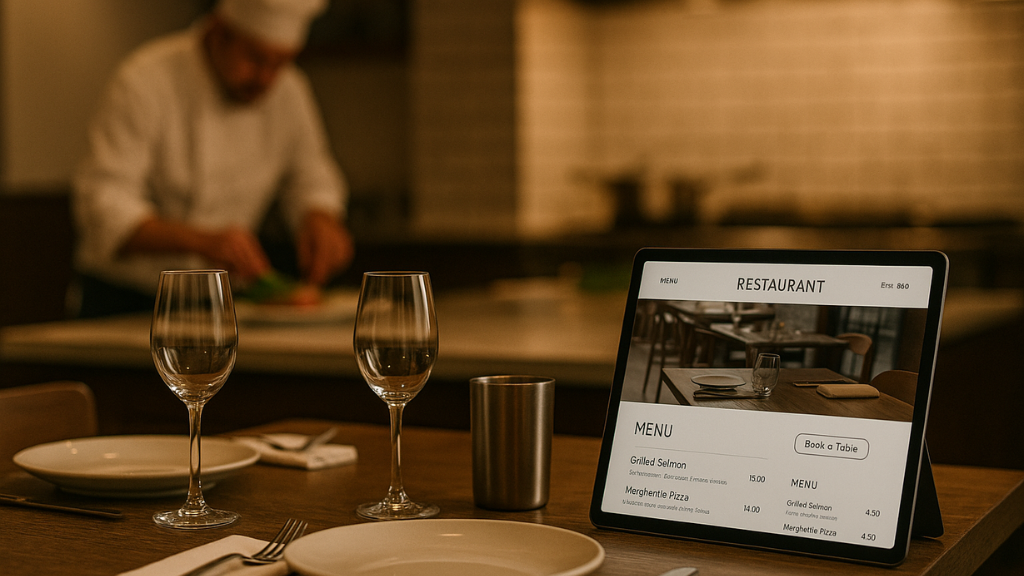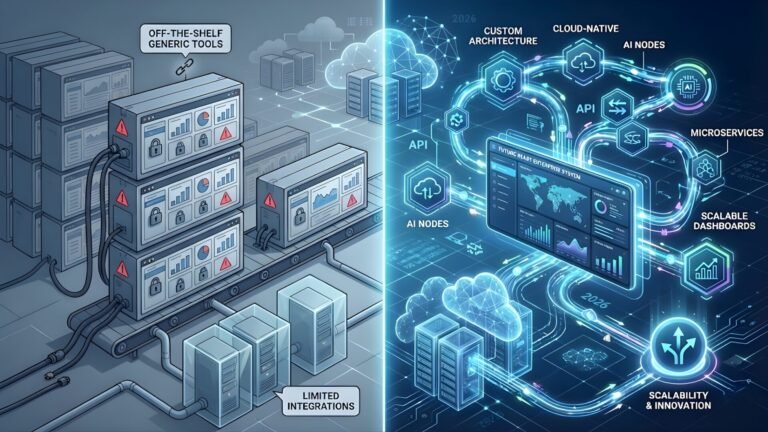Welcome to Flutebyte Technologies

In today’s digital landscape, having a professional website is essential for any restaurant. Customers expect to find menus, hours, and contact information online. In fact, recent research indicates roughly 77% of diners check a restaurant’s website before visiting or ordering. When considering a restaurant website developer, it’s crucial to assess the full scope of the project before making a hiring decision. Key considerations include required features, budget, design agency options, hosting needs, and ongoing support. By planning carefully and asking the right questions, decision-makers can find a developer or agency that meets their needs.
Table of Contents
Define Your Goals and Essential Features
Before hiring, outline what your restaurant website must accomplish. Do you need an online menu, reservations, or an ordering system? Key features often include:
- Online Menu: A clear, easy-to-update menu with prices and photos, crucial for guest engagement.
- Online Ordering/Reservations: Integration with delivery and reservation platforms to boost convenience (many diners expect this).
- Contact/Location Info: A Google Map embed, phone number, and clickable email to help customers find and reach you easily.
- High-Quality Images: Professional food and venue photos to entice visitors.
- Mobile-Responsive Design: A responsive layout so the site works smoothly on any device.
- Customer Reviews/Testimonials: Highlighting positive reviews or testimonials (such as Yelp or Google ratings) can build trust and encourage new diners.
- SEO and Social Integration: A site structure optimized for search and links to social media to attract more traffic.
Outlining these requirements lets you communicate clearly with a restaurant website developer or affordable website developer about your project scope. This checklist approach ensures the selected team can build the specific functionality your business needs.
Set a Clear Budget and Value Expectations
Budgeting is a critical step. As a guideline, domain names may cost only $10–$20 per year and reliable hosting typically runs $100–$500 annually. The bulk of a website budget usually goes toward custom design and development. In context, a professional site from a full-service agency often ranges around $5,000–$10,000, depending on complexity. If you have limited funds, compare the cost-benefit of doing it in-house versus hiring an expert. Remember that investing in a quality site often pays off through higher orders and brand visibility. Be wary of extremely low bids, however; cutting corners can compromise quality and future performance.
Choosing a Developer or Agency
Next, decide between hiring a freelance developer, in-house staff, or a web development agency (web developers agency). Agencies often provide bundled web design and hosting services and ongoing maintenance in one package, which can simplify management. For those on a tight budget, an affordable website developer (such as a freelancer) might be a starting point, but remember a full agency brings more resources and accountability. Look for a provider with experience in restaurant or hospitality websites. Check that their portfolio includes similar projects. A strong portfolio demonstrates relevant skills and style. Ask about their specialization in restaurant-specific features (for example, menu and reservation integrations).
Communication and collaboration style is another key factor. Choose an agency or developer who listens to your ideas, offers clear timelines, and provides regular updates. Good project management (often via Agile or Scrum) helps ensure deadlines are met. Verify that they respond promptly and understand your vision for a user-friendly restaurant website. Evaluate their reviews and testimonials on third-party sites to gauge reliability.
Experience, Portfolio, and Technical Expertise
When interviewing candidates, focus on relevant experience and technical skills:
- Relevant Experience: Seek developers who have built restaurant or similar service-oriented websites. They’ll understand industry nuances like menu layouts or reservation systems.
- Portfolio/Case Studies: Examine their completed projects for design quality and functionality. Look for diversity (different layouts, mobile-friendly designs) and evidence of SEO best practices.
- Technical Skills: Ensure they are proficient in front-end (HTML, CSS, JavaScript) and back-end (PHP, Node.js, etc.) as needed for your site. If you plan to use a CMS like WordPress or an e-commerce platform like Shopify, confirm their expertise with those systems.
- Design Skills: The developer should create an attractive, brand-aligned design that is easy to navigate. Check that their work follows modern standards and visual trends.
- SEO Knowledge: A restaurant site should be SEO-ready from the start. Ask how they handle on-page SEO – do they optimize URLs, meta tags, and site speed? Developers familiar with SEO can help your site rank better on search engines.
The goal is a partner who can build a site that looks great, works well on mobile, and ranks well in search results.
Mobile Responsiveness and Design Quality
Mobile usage is especially high for restaurant searches. According to industry data, 90% of people do dining research online before visiting a restaurant, and 60% of food orders are placed via smartphones. This makes mobile optimization non-negotiable. Ensure your developer builds a mobile-responsive design that adapts to all screen sizes. During review, test any sample sites on smartphones and tablets to confirm fast load times and easy navigation. A modern, clean design with logical navigation helps customers find what they need quickly.
Hosting, Security, and Maintenance
Discuss hosting options early. Will the developer provide hosting, or do you need to arrange your own? Professional hosting ensures high uptime and security. Expect to pay $100–$500 per year for reliable hosting that can handle restaurant traffic. Your host should offer SSL certificates (for HTTPS security) and backup solutions. A fast server improves user experience and SEO. Ask if the developer will configure caching and other speed optimizations.
Plan for ongoing maintenance after launch. Websites require regular updates, security patches, and backups. The right developer or agency should offer a maintenance plan for things like:
- CMS and plugin updates to keep the site secure.
- Fixing bugs or making minor changes (menu updates, new photos).
- Performance monitoring (ensuring the site remains fast).
Having a support agreement (even at $40–$300 per month) ensures you’re not left scrambling when issues arise. Confirm in writing what post-launch support is included.
Ongoing Support and Training
Your relationship with the developer shouldn’t end at launch. Ideally, the team will provide documentation or training so you can update content like menus and hours if needed. Also ensure they handle the handoff clearly, giving you all necessary credentials and access. Regular check-ins can be very valuable; even a short monthly call to review performance metrics keeps the site effective. A developer who becomes a long-term partner will understand your business growth and support updates over time.
SEO Readiness and Local Search
A great design is not enough if customers can’t find you online. Ensure the developer follows SEO best practices:
- Clean, crawlable code and site structure.
- Fast load times and optimized images.
- Setup of Google Business Profile and local directory listings.
- Keyword-optimized titles and descriptions.
- Inclusion of schema markup for menu and address (if applicable).
An SEO-friendly site is more likely to appear in local search results. Remember that content matters too – consider adding blog updates or news sections in the future, and make sure the developer builds the site so you can easily add content or meta tags later. A knowledgeable developer can guide you in setting up these foundations for better search visibility.
Conclusion and Next Steps
Hiring the right restaurant website developer requires thoughtful planning. By outlining your goals, prioritizing key features, and vetting candidates on experience and responsiveness, you can find a developer or agency that fits your needs. Always balance cost with expertise – an affordable website developer who delivers a high-quality, SEO-friendly site is often worth the investment.
For restaurants ready to move forward, consider Flutebyte Technologies as your development partner. Flutebyte offers comprehensive web development and IT services, including custom website builds, software solutions, Shopify and SaaS development, and ongoing support. With experience across many industries, Flutebyte can deliver a robust, secure, and professional website tailored to your restaurant’s brand and business goals.
FAQs
1. What features should I ask a restaurant website developer to include?
Key features include an easy-to-update online menu, online ordering or reservation integrations, clear contact/location info, and high-quality images of your food and venue. Ensure the site is mobile-friendly and has SEO-optimized content. A good developer will make sure these essentials are in place.
2. How do I balance cost and quality when hiring a website developer?
Define your budget and priorities upfront. It’s often better to pay slightly more for a developer with proven experience and support than to save money on someone inexperienced. Compare quotes from several candidates, and be wary of extremely low prices, which can signal poor quality. Consider value for money, including long-term ROI and ongoing maintenance.
3. Why is mobile optimization important for my restaurant site?
A majority of restaurant searches and orders happen on smartphones. A mobile-responsive design ensures your site looks good and functions well on all devices. Data shows roughly 90% of diners research restaurants online and 60% order via mobile. If your site isn’t optimized for mobile, you could lose many potential customers.
4. What is the difference between hiring a freelance developer and an agency?
A freelance developer may cost less but could have limited availability and expertise in certain areas. A web development agency (often providing web design and hosting services together) brings a full team covering design, coding, SEO, and maintenance. Agencies may offer broader expertise and ongoing support, while freelancers might be more affordable for simple sites. Choose based on your project complexity and support needs.
5. What ongoing support should I expect from a restaurant website developer?
After launch, your developer should offer maintenance like security updates, backups, and bug fixes. Training on how to update your content (like menus) is valuable. Look for service agreements that include support hours or a maintenance plan. Ongoing collaboration ensures the website stays current, secure, and aligned with your business growth.
Sources
- Restroworks: Create A Restaurant Website: Step-By-Step Guide For Success (Mar 2025)
- Tableo: Deciding if you need a website developer: A guide for restaurant owners (Jul 2023)
- Hurrdat Marketing: Your Complete Guide to SEO for Restaurants (Jun 2025)
- Icecube Digital: Top 10 Features Every Successful Restaurant Website Should Have (2024)
- VinDevs: How to Choose the Right Web Development Agency (Jul 2024)



